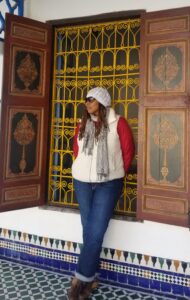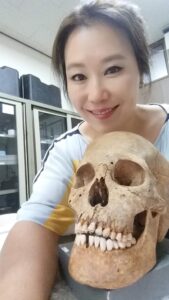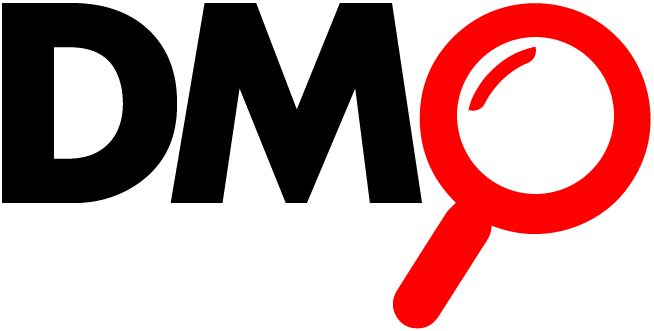DMP Podcast, Episode 1
In this episode, DMP collaborators Michi and Juan interview Davidson College Anthropology professors Dr. Laurian Bowles and Dr. Helen Cho about systemic racism, its manifestation in academic institutional contexts, and microaggressions. They reflect upon their educational and professional paths and discuss their experiences as students and professors, and offer their perspectives about how Davidson College has changed in light of diversity, inclusion, and equity in their time as members of the college community. Drs. Bowles and Cho offer strategies to process and deal with microaggressions both as a microaggressee and microaggressor. Check out our guests’ detailed bios below and their resource recommendations to benefit us all in the spirit of further self-education.

Laurian Bowles, Ph.D.
I am a cultural anthropologist who researches, writes, and teaches about social mobility, sensory politics, and the visual economies of women’s labor in Africa and the Diaspora. As a critically engaged scholar with 20 years of fieldwork in Ghana, I attend to the way women’s activism takes shape through quotidian forms of mobilization and refusals in public and intimate spaces. I am especially interested in the haptic nature of photographs, the circulation of pictures as material artifacts, and the way blackness, class politics, and queerness are formed through visual storytelling.
A born and bred Philly jawn & Girls’ High girl (link girls’ high https://girlshs.philasd.org/), my love of stories is shaped by my non-academic work as a queer youth counselor in rural Pennsylvania, a West Philly bartender, and A&R intern for a record label in London. I earned Bachelor’s degrees in both African American Studies and Journalism at Penn State University, an MA in Anthropology of Media from SOAS, University of London and a Ph.D. in Anthropology from Temple University, where my dissertation used photo-diaries to examine the gendered politics of women’s labor at marketplaces in Accra, Ghana.
I am currently an Associate Professor and Chair of Anthropology at Davidson College and an affiliated faculty member in the Africana Studies and Gender and Sexuality Studies departments. I am also the Program and Resident Director of the Davidson in Ghana (link: https://ghana.davidson.edu/) study abroad program.
Dr. Bowles’ recommendations to continue the educational journey:
Books:
- Yee, Jessica. 2011. Feminism for real: deconstructing the academic industrial complex of feminism. Canadian Centre for Policy Alternatives
- Howard Zinn, A People’s History of the United States
- John L Jackson, Racial Paranoia: The Unintended Consequences of Political Correctness, Basic Civitas, 2008
- John L Jackson, Impolite Conversations: On Race, Class, Sex, Religion, and Politics, co-written with Cora Daniels, Atria Books
Articles:
- Bailey, Moya, and Trudy. “On misogynoir: citation, erasure, and plagiarism.” Feminist Media Studies 18, no. 4 (2018): 762-768.
- Bailey, Moya. “Misogynoir in Medical Media: On Caster Semenya and R. Kelly.” Catalyst: Feminism, theory, technoscience 2, no. 2 (2016).
Movies:
- Higher Learning (1995)
- Dear White People (2014)
- American History X (1998)
- Queen Sugar (2016)
- Cider House Rules (1999)
TV Shows:
- Little Fires Everywhere (2020)
- Hollywood (Netflix show) (2020)
Helen Cho, Ph.D.

My academic training and interest is human osteology, specifically its applications in forensic anthropology, clinical research, and bioarchaeology. Investigation of contemporary and archaeological skeletal populations from different time periods and geographical locales entails the understanding of biological variation from evolutionary and ecological perspectives. That is, human populations have biological diversity because of evolutionary forces, past and present migrations, the physical environment, and so much more and the human skeleton is no exception. My graduate training and research largely looked like standard STEM, with microscopes, fume hoods, and labs and some anthropological questions. My perpetual restlessness and love of travel complemented the need for bone samples from diverse populations from Imperial Rome to contemporary Mexico to 18th century Korea to a Tennessee morgue.
It wasn’t until I started teaching at Davidson in 2002 that my anthropological framework matured. Through the process of designing various biological anthropology courses and learning from a handful of Davidson colleagues, I came to center race in my osteology research, teaching, and professional responsibilities. I read about and witnessed the 20th and 21st century renditions of racist science in my discipline. And for a decade or so I went through the unpleasant and emotionally exhausting cognitive dissonance regarding my identity. Having moved from country to country every three years from birth until college and attending schools that looked like mini-United Nations, my identity was an international, third culture, female student with a Korean passport. Throughout the twelve years of undergraduate and graduate school in the Midwest I still classified myself as an international student with an F1 visa. North Carolina and Davidson College thrust upon me the Asian race, minority status, and racism. I birthed twin girls who are biracial and not white-passing and I begrudgingly gave up my Korean passport for an American one. Fast forward to 2020, I’m thankful for the cognitive dissonance and the numerous opportunities in academia and my professional organizations to direct others’ attention to race and racism. The topics of race and racism are ever-present in my personal and professional spheres, in the classroom and while doing osteology research, on campus and at conferences, at the dinner table and reading an article.
Dr. Cho’s recommendations to continue the educational journey:
Podcasts:
- Code Switch
- 1619
- Scene on Radio
Videos:
Books:
- White Fragility by DiAngelo
- The Mismeasure of Man by Gould
Websites:
